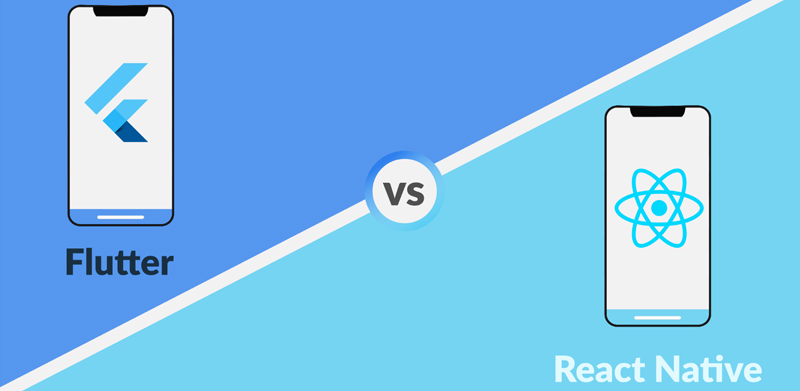React Native vs Flutter – What to Choose?
Cross-platform solutions are gaining popularity to develop mobile applications. Flutter (created by google) and React Native (created by facebook) are the two leading market players. If you have to pick React Native or Flutter which one should you pick?

The answer of this question is not as simple as it looks. The answer to this question depends on your business needs and use-cases. Both React Native and Flutter are powerful mobile development frameworks with their own set of pros and cons.
Let’s explore React Native vs. Flutter against several factors that might help you to choose one of the framework for your business needs.
Learning Curve
React Native – React Native is written entirely in JavaScript. This is a huge perk for React Native since JavaScript ranks as one of the most popular and used programming languages in the world. Finding developers to code in JavaScript is easy and hence learning React Native is quite easy for any JavaScript developer.
Flutter – Flutter is written in a language called Dart. Although, Dart is relatively easy to pick up and is a good programming language, it does not have the popularity that JavaScript has. Typically, developers from a C++/Java background can relate to Dart more than a JavaScript developer.
Performance
There is a common notion that Flutter performs better than React Native. This could be because Flutter does not have a JavaScript bridge like React Native to interact with native components. Dart code is compiled to native machine code, hence eliminating the JavaScript bridge. This improves the performance in comparison to React Native which uses the JavaScript bridge.
But there have not been any real-time profiling comparisons that proves Flutter is superior than React Native.
Build & Release Automation Support
Releasing mobile apps to the App Store or Play Store is a painful process. It involves the complex task of code signing all another application setup. When it comes to cross-platform mobile app development, it gets even trickier.
React Native — React Native official documentation doesn’t have any automated steps to deploy the iOS apps to App Store.
Flutter — Flutter has a strong command line interface. We can create a binary of the app by using the command line tools.
Community Support
React Native — React Native launched in 2015 and has gained in popularity ever since. There is a community of React Native developers on GitHub, stackoverflow and lots of meetups and conferences around the world.
Flutter — Flutter has been around for a while but it gained a lot of attention when Google promoted it in the Google I/O conference in 2017. The Flutter community is growing rapidly these days, meetups and conferences are taking place online.
Adoption
React Native — React Native is widely adopted and some of its popularity is also due to the success of React. React developers can jump on board and easily develop React Native mobile apps. Today products like Facebook, Instagram, Uber Eats, Tesla, FlatMate and many more use React Native for their mobile applications.
Flutter — With Google being the backer of Flutter, it has gained quite a bit of attention. Alibaba, Google Ads and Hamilton, has adopted Flutter for one of their mobile apps.
Conclusion
On an honest note, both the technologies are supreme in their own space. If you will analyze then you can see that React Native is very popular owing to the multiple aspects. One of the biggest advantages it gives to the businesses is to control the cost factor and reduced delivery time.
Some of the industry experts have predicted that Flutter is the future of mobile app development. I would suggest that let us not predict the future, but wait and watch!

Leave a Reply